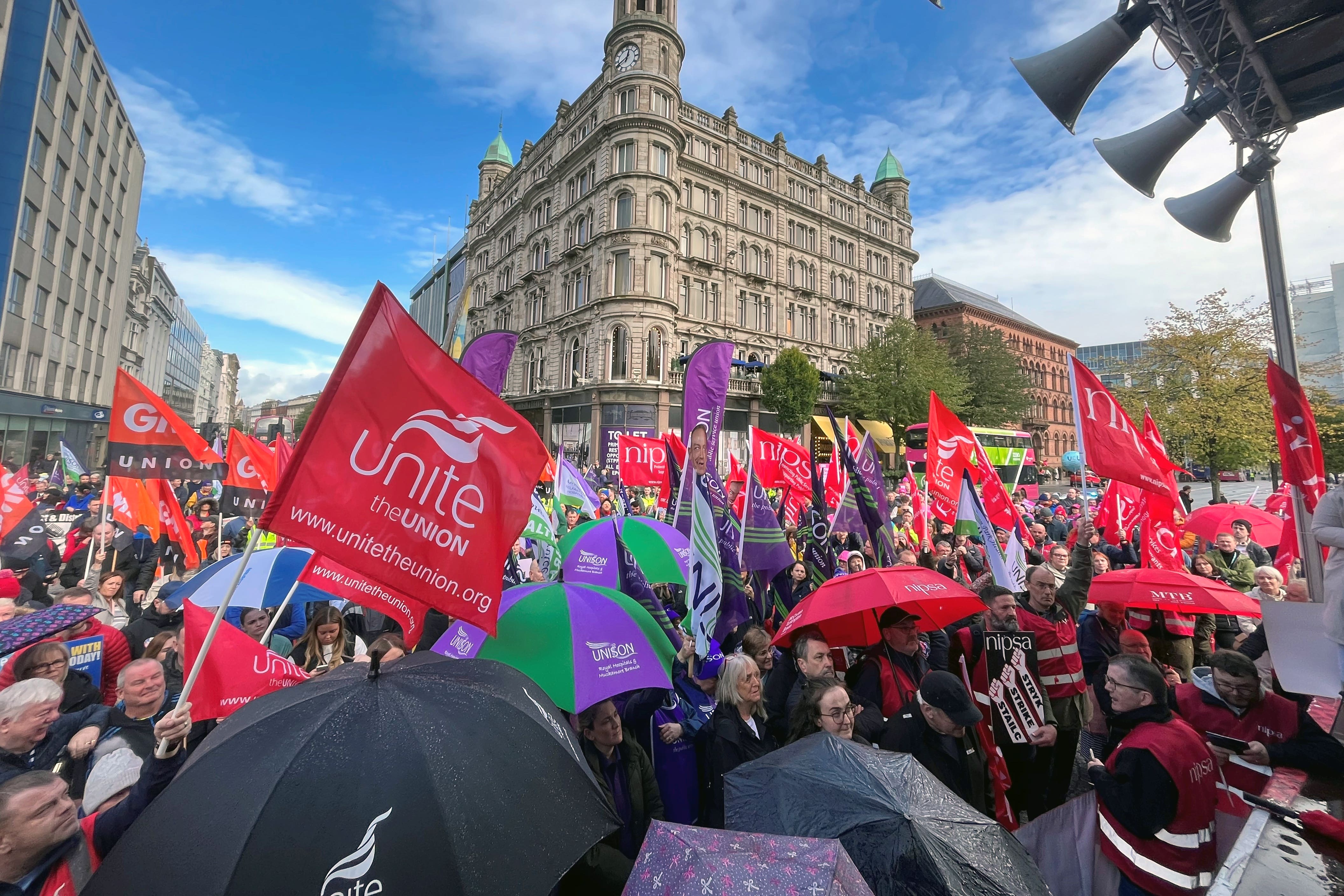Significance of Northern Ireland strike ‘should not be underestimated’
An estimated 150,000 workers from sectors including education, health, police staff and transport will take part in the walkouts over a pay award.

Your support helps us to tell the story
From reproductive rights to climate change to Big Tech, The Independent is on the ground when the story is developing. Whether it's investigating the financials of Elon Musk's pro-Trump PAC or producing our latest documentary, 'The A Word', which shines a light on the American women fighting for reproductive rights, we know how important it is to parse out the facts from the messaging.
At such a critical moment in US history, we need reporters on the ground. Your donation allows us to keep sending journalists to speak to both sides of the story.
The Independent is trusted by Americans across the entire political spectrum. And unlike many other quality news outlets, we choose not to lock Americans out of our reporting and analysis with paywalls. We believe quality journalism should be available to everyone, paid for by those who can afford it.
Your support makes all the difference.The significance of what is expected to be the largest strike to take place in Northern Ireland’s recent history “should not be underestimated”, the Belfast Trades Council has said.
An estimated 150,000 public sector workers from sectors including health, education, police staff, transport, roads maintenance and civil servants will take part in the walkouts over a pay award.
There have been warnings of serious disruption due to services such as road gritting being withdrawn.
Schools will be closed and hospitals operating reduced services, while the Department for Infrastructure has advised against any unnecessary travel.
There are expected to be picket lines, parades and rallies across Northern Ireland, including at Belfast City Hall, the Guildhall Square in Londonderry, Omagh court house and Enniskillen town hall.
Temporary Assistant Chief Constable Melanie Jones said a significant policing operation will be in place across the day, with a visible presence at parades and picket lines.
“We are there to monitor crowds, minimise disruption and to keep everyone safe,” she said.
“A number of large parades are planned across the country including in Belfast, Derry/Londonderry, Fermanagh and Omagh. We anticipate some traffic disruption in these areas and have issued guidance on our social media channels about the potential for delays. I would encourage the public to check this guidance before they travel.
“With the icy conditions and the disruption to gritting operations, I also want to highlight the advice recently issued by the Department of Infrastructure that people should avoid unnecessary travel. If you do need to use the roads, please take extra care and allow additional time for your journey.”
She added: “I want to reassure the public that we have clear plans, command structures and highly capable officers in place across the country who have significant experience carrying out this type of public safety operation.”
Secretary of State Chris Heaton-Harris has been urged to intervene and secure the funding for the pay awards in the absence of a functioning Stormont Assembly and executive.
However he has insisted that public sector pay is a devolved matter.
Tomorrow it will again become clear that not a wheel turns or a light switches on without the intervention of a worker
In December Mr Heaton-Harris offered the Stormont parties a £3.3 billion package to stabilise finances in Northern Ireland – which included £600 million to settle public sector pay claims.
It will be available when the institutions are restored.
A last-ditch attempt to revive Stormont with an Assembly recall on Wednesday was not successful, with the DUP maintaining its position to not participate in devolved government until unionist concerns over post-Brexit trading arrangements are addressed.
Kerry Fleck, vice president of the Belfast and District Trades Union Council, said 150,000 workers from 16 trade unions will take part in the strike action.
“The significance of this moment should not be underestimated,” she said.
“Across Northern Ireland tomorrow we will see workers, as in many key moments in our history, set aside differences and stand together to say ‘no more’ to the push back on rights, wages and terms and conditions; ‘no more’ to the planned destruction of our public services; ‘no more’ to food banks, hungry children and freezing homes.
“Tomorrow it will again become clear that not a wheel turns or a light switches on without the intervention of a worker.
“This is a crucial moment for a renewed trade union movement to demonstrate the power that lies in the hands of all working people and that unity and solidarity are how we win a better world and defend our collective interests.”